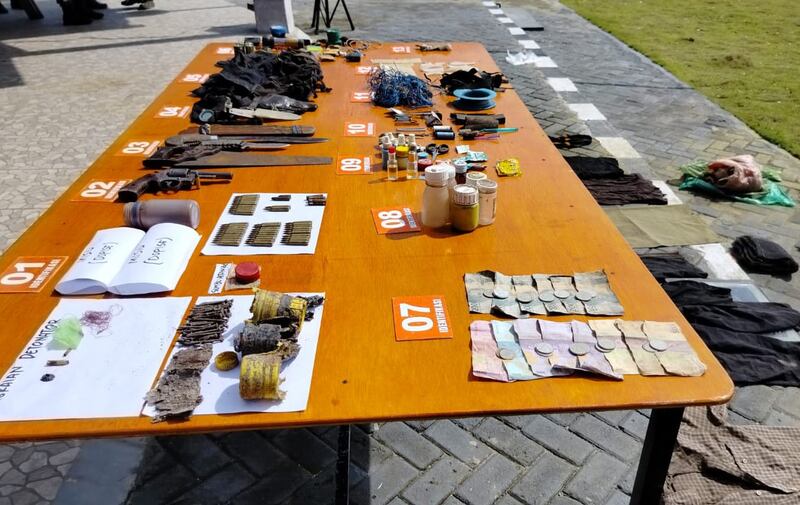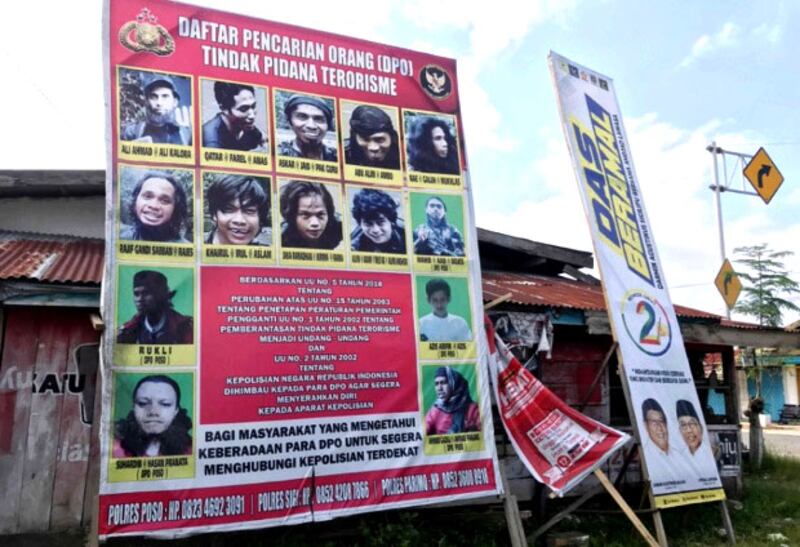An Indonesian Islamic State group-linked militant organization has been wiped out with the killing of its last member, after a years-long campaign involving soldiers and police, officials said Friday.
The Eastern Indonesia Mujahideen (MIT) had been dying a slow death until its leader Ali Kalora was killed last September, whittling the group down to four members.
It finally perished on Thursday, when the last holdout named Jaid (also known as Pak Guru) was killed in a gunfight with anti-terror police in Poso Pesisir Utara, a district of Central Sulawesi province, said provincial police chief Inspector General Rudy Sufahriadi.
“With Jaid’s death, all MIT fugitives are gone,” Rudy told reporters in Palu.
“Let’s hope this is the end of the hunt. And of course this could not have been achieved without the support of all parties,” he said.

After Jaid was killed, police found items in his backpack, including a standard-issue revolver with bullets and three home-made bombs, said Central Sulawesi police spokesman Didik Supranoto.
Jaid was a senior MIT member who had joined the group since its inception, was skilled in bomb-making and was involved in a series of attacks on civilians, according to Didik.
“Everywhere he went he carried homemade bombs,” Didik said.
Rudy said security forces taking part in Operation Madago Raya had tracked Jaid’s movements to the mountainous jungles of Poso regency after one of two remaining MIT militants, named Nae, had died from gunshot wounds he sustained in a shootout with police in May.
Moh Adhe Bhakti, a researcher at the Center for the Study of Radicalism and Deradicalization (PAKAR), said Nae’s death had not been confirmed.
“Nae’s body was not found by the Operation Madago Raya task force in Poso. Hopefully, news about his death is true, so the hunt for MIT fugitives in Central Sulawesi has ended,” Adhe told BenarNews.

MIT formed in 2010 as a reaction to Christian-Muslim sectarian violence in Poso town that left more than 1,000 people dead between 1998 and 2001.
Their mission was to establish an Islamic state in Indonesia. The group is known for its grisly killings of police and civilians it said were informants for security forces.
MIT was largely focused on Poso and its surrounding regencies, and over the years, many MIT leaders hailed from Poso. Most notable among them was a charismatic man called Santoso who had succeeded in broadening the militant base in Poso.
One of the first major successes of the Indonesian security forces against MIT was the killing of Santoso in 2016, Indonesia’s most wanted militant at the time. He had been the first Indonesian militant to publicly pledge allegiance to the so-called Islamic State (IS) militant group.
In January 2016, the government launched Operation Tinombala, a joint military-police task force, with a mission to capture or kill MIT militants. The name changed to Madago Raya (Kindness), as part of a strategy that focused on humanitarian and social activities, police said.
In 2021, the task force had more than 1,300 members. At the start of this year, authorities reduced that number to 400.

‘Still many sympathizers’
Although all MIT fugitives had either been arrested or killed, MIT still had some support, particularly in Poso, Bima in West Nusa Tenggara province and Makassar in South Sulawesi, PAKAR’s Adhe said.
Additionally, the threat of terrorism in Poso is by no means over, said Deka Anwar, a researcher at the Jakarta-based Institute for Policy Analysis of Conflict (IPAC).
Poso will remain a magnet for militants, especially those with ties to the Muslim-Christian conflict there at the turn of the century, Deka said.
“Prevention is important for security forces, including monitoring the MIT network outside Poso, such as in Bima and in other provinces,” said Deka, referring to those who supported and sent fund to MIT.
Police should also pay attention to terrorism financing and fundraising efforts by militant groups, he added.
“Terrorism financing is not only for the purpose of carrying out acts of terrorism, but also to keep network members loyal, whether they are in prison, or their children, wives, and other relatives,” Deka said.
Rudy, the Central Sulawesi police chief, said security operations in Poso may still continue, but that would be up to the national leadership.
“If another operation should be carried out, it would be no longer about hunting MIT fugitives,” he said.
“There are still many [MIT] sympathizers that we need to educate properly.”
